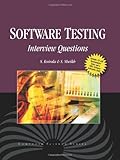Software Testing: Interview Questions (Computer Science)
The competence and quality of software testers are often judged by the various testing techniques they have mastered. As the name suggests, the book provides a self-study format and is designed for certification course review, and for freshers as well as professionals who are searching for opportunities in the software testing field. Along with software testing basics, the book covers software testing techniques and interview questions (e.g., Six Sigma and CMMI) which are important from the Software Quality Assurance (SQA) perspective. It also has in-depth coverage of software expense estimation topics like function points (FPA) and TPA analysis. A CD-ROM supplements the content with the TestCompleteTM software-testing tool setup, software estimation templates (PDFs), an interview rating sheet, a sample resume, third-party contributions, and more.
List Price: $ 57.95
Price: $ 6.57
Check This:
 Six Sigma Workbook For Dummies
Six Sigma Workbook For DummiesImprove your efficiency — and bring in big profits!Need help implementing or understanding Six Sigma? Want to take this powerful …
 Six Sigma For Dummies
Six Sigma For DummiesThe world’s largest and most profitable companies – including the likes of GE, Bank of America, Honeywell, DuPont, Samsung, St…
 The Certified Six Sigma Black Belt Handbook
The Certified Six Sigma Black Belt HandbookThe Certified Six Sigma Black Belt Handbook is the most comprehensive reference for all Six Sigma Black Belts (or anyone planning …
 Six Sigma for Green Belts and Champions: Foundations, DMAIC, Tools, Cases, and Certification
Six Sigma for Green Belts and Champions: Foundations, DMAIC, Tools, Cases, and Certification“Much has been said or written in recent times about the value of Six Sigma methodologies in driving organizational improvement. Y…



An explanation of the critical skills that the best software testers need,
When I was working as a programmer on a software development team in the 1990’s, we considered testing to be a menial task. We were not unique, that was the general consensus among developers at that time. Much has changed since then, now with visual development environments, automatic code generators and component libraries, coders don’t necessarily write a lot of original code. However, the amount of code that has to be tested is greater now than ever before. Furthermore, the complexity of the tests is now also orders of magnitude higher than it was before.
While there is a great deal of science to software testing, it is still very much an art. Even with automated testing programs, it is still only rarely possible to run the software through every possible path. Therefore, people who are capable of creating and understanding effective test plans are now in high demand. What was once considered the low-level job of tester is now one of the most critical positions in the software development team.
This book is designed to prepare the applicant for a position as a software tester for the application and technical interview process. It contains a themed series of questions that the prospect could be asked during the technical phase of the interview. Chapter 1 covers the software testing basics and some of the questions are:
*) In what software life cycle phase does testing occur?
*) Can you explain the PDCA cycle and where testing fits in?
*) What is the difference between a defect and a failure?
Each question is followed by a detailed solution with associated figures when needed.
The remaining chapters are:
*) Testing techniques
*) The software process
*) CMMI
*) Six sigma
*) Metrics
*) Automated testing
*) Testing estimation
The format of these chapters is the same as that of chapter 1.
A CD containing a TestCompleteTM demo, a software estimation book with templates, data from the book, a sheet that can be used to rate an interview and a sample resume is also included.
If you are interested in entering the increasingly challenging and important field of software testing, then this book will give you the information that will allow you to ace the technical aspects of the interview. With over 122 questions with solutions presented
Was this review helpful to you?

|